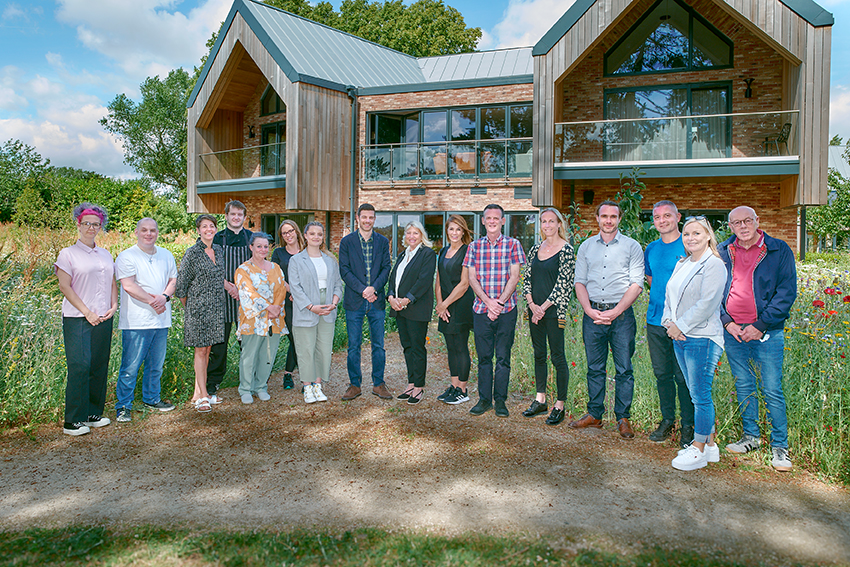Also known as Stress Response Syndrome (SRS) adjustment disorder is a disproportionate or irrational reaction to a stressful event or change in someone’s circumstances that causes distress and impairs daily functioning in home, work or personal life. Both traumatic and non-traumatic events can lead to adjustment disorder, from witnessing a death to job loss. Negative emotional and behavioural symptoms usually begin immediately after the stressor or in the three months that follow. (1)
Some people may start to rely on alcohol or drugs in order to cope with an unexpected turn of events or develop other addictive behaviours, such as excessive mobile phone use, to escape challenging feelings. As well as offering residential treatment for alcohol addiction, drug addiction and other addictions, Delamere wellness retreat offers a wide range of progressive therapies to help people cope with anxiety resulting from adjustment disorder. If you’re struggling to adjust after a life-altering event, please get in touch and see how we can help.

Worried about adjustment disorder? Speak to the team at Delamere
What causes adjustment disorder?
According to psychologists, adjustment disorder might be the result of a one-off event or the culmination of many stressful events. Problems within a marriage, work or with finances can often be a source of stress for adults. Whereas in children and adolescents adjustment disorder could be the result of continuous exposure to family arguments, academic pressure or issues with sexuality. Other stressors include natural disasters and health problems, such as cancer.
Everyone reacts to stress in different ways, but several factors can influence a person’s ability to adapt and cope, such as the level of support available, as well as their social skills, intelligence and even genetics. Anyone can develop adjustment disorder but people from disadvantaged backgrounds seem to be more likely to suffer as they may have been exposed to stressors such as financial hardships or a high-crime neighbourhood.
Signs and symptoms of adjustment disorder
Adjustment disorder has always been hard to diagnose as it has wider parameters than other stress-related disorders, such as Post-traumatic Stress Disorder (PTSD). However, in recent years there has been a redefinition of diagnostic criteria which has helped to clarify the signs and symptoms of this poorly understood disorder.
Multiple studies have identified the main symptoms of adjustment disorder as being preoccupation with the stressful event and ‘failure to adapt’, this includes intrusive memories, sleep disturbances and difficulty concentrating. (2)
Mental symptoms of adjustment disorder:
- Sadness and hopelessness
- Crying incessantly
- Anxiety and stress
- Lack of appetite
- Feeling overwhelmed
- Difficulty functioning
- Rebellious or impulsive actions
- Being withdrawn
- Physical symptoms of adjustment disorder:
- Insomnia
- Shaking or tremors
- Exhaustion
- Aches and pains
- Headaches
- Stomach problems
As adjustment disorder symptoms usually include being sad and tearful, it is sometimes referred to as ‘situational depression’. While children’s symptoms tend to revolve around changes in behaviour, adults can display more emotional problems, such as feeling anxious. If you have experienced a stressful event and don’t feel like you’re coping, there is help available.
Delamere wellness retreat offers a wide range of residential rehab programmes that help people to process traumatic events and manage adjustment disorder with anxiety. This is especially beneficial if alcohol or drug abuse is involved as our holistic therapists can also assist with clinical detoxes, medication and nutritional support.
Adjustment disorder with anxiety
Generalised Anxiety Disorder (GAD) has symptoms that are very similar to adjustment disorder but last longer. These include feeling sad, changes in sleep patterns and feeling constant worry. Symptoms of adjustment disorder with anxiety typically resolve within around six months, whereas GAD can be constant and long-lasting. Children who suffer from adjustment disorder will often have separation anxiety. If you’ve been experiencing distressing symptoms of adjustment disorder with anxiety for several weeks, it’s worth seeking professional advice.
Delamere can help you understand the root cause of your problems, whether this is adjustment disorder or otherwise, and learn how to cope with anxiety. Our holistic therapists will put a treatment programme in place to combat any negative emotions and behaviours as well as giving you the tools to avoid triggering memories of your stressful life event. If you’re concerned for yourself or a loved one, get help today.
Adjustment disorder treatment
If left untreated, adjustment disorder can have devastating long-term consequences, especially for young people. It is usually treated with a combination of therapy, medication and ongoing support. Delamere takes a holistic approach to therapy, using a careful balance of evidence-based practices to deliver private adjustment disorder treatment in Cheshire. Here are some of the ways we can help:
Medication for adjustment disorder
Anti-anxiety medications (benzodiazepines) and anti-depressants are often prescribed for adjustment disorder treatment. Hypnotic agents, such as Valium, may also be offered to help with sleep problems. As well as determining the best pharmacological support, Delamere wellness retreat can provide nutritional supplements and balanced meals to ensure you’re in the best shape to return to full health.
Cognitive Behavioural Therapy (CBT) for adjustment disorder
Psychotherapy, also known as ‘talking therapy’, is one of the most common treatments for adjustment disorders. There are many different types of psychotherapies, but Cognitive Behavioural Therapy (CBT) is very successful in helping people to understand their problems, communicate with others and counteract negative feelings. It also gives people the tools to cope better by becoming more aware of their responses to certain situations or people, which promotes recovery. Family therapy can be helpful if the main stressor is related to interpersonal relationships or childhood experiences.
Ongoing support in adjustment disorder treatment
It’s incredibly important that you build a good support network following adjustment disorder treatment to ensure you can continue using the tools you’ve learnt in therapy and remain able to cope with any triggers. Delamere encourages guests to keep in touch with peers and hosts regular meetings and counselling sessions in the 12 months following our residential rehab programmes to support you in your daily life.
How can Delamere help with adjustment disorder?
Set in peaceful surroundings on the edge of Delamere forest, our purpose-built retreat has been designed to meet the needs of anyone struggling with adjustment disorder. It’s a space where you can truly switch off from the stresses of life and start to process your emotions.
We have an expert team of holistic therapists who can support your recovery with one-to-one therapy and group therapy sessions as well as a range of somatic healing experiences which will help you cope with stressful events going forward.

If your adjustment disorder has led to a reliance on alcohol or drugs, we can also arrange a clinical detox to help you withdraw safely from the comfort of your own ensuite room. Our residential rehab programmes for adjustment disorder treatment are based on a unique three stage approach which considers all aspects of your life and helps to manage your symptoms mentally, physically and emotionally.
We will work with you to identify the people, places or things that are triggering negative emotions or behaviours and to develop coping mechanisms that will support you in work and home life. You will leave our care with a good support network to ensure you can break free from the past and enjoy a stress-free future.
If you think you may be suffering with adjustment disorder, call us confidentially to speak to a member of the team today. Contact Delamere
References
1. O’Donnell ML, Agathos JA, Metcalf O, Gibson K, Lau W. Adjustment Disorder: Current Developments and Future Directions. Int J Environ Res Public Health. 2019 Jul 16;16(14):2537. doi: 10.3390/ijerph16142537. PMID: 31315203; PMCID: PMC6678970.
2. Meaghan L. O’Donnell et. al.Int J Environ Res Public Health. 2019 Jul; 16(14): 2537. Published online 2019 Jul 16.






